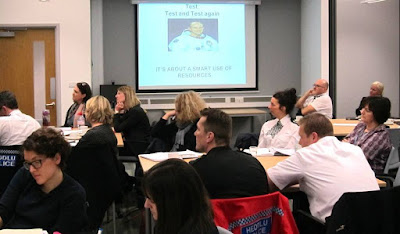“Problem Oriented Policing (POP) has a history of looking at those long term problems; those ‘it’s been there for years...nothing we can do about it’ occurrences. The best strategy for solving a problem depends largely on understanding the situation, learning everything you can about why it’s happening and then using factual knowledge, and sometimes creative use of partners to come up with effective, longer term solutions.” Sylvia Chenery.
I was possibly the only person attending from the voluntary sector (others had been invited), but numerous statutory partners came along, including: Mid & West Fire & Rescue, Trading Standards, Mid Wales Housing, Probation, Health and Mid & West Wales Ambulance. There were also many police officers and managers present, including Chief Inspector Rhiannon Ivens who leads on Partnerships in Powys for the force.
 |
| Penny Price, Lisa Hale (Powys Teaching Health Board) and Police Inspector Kathryn Griffiths |
On her recent work with the Bermuda Police (yes, Bermuda the sub-tropical island which is also a British Overseas Territory!) Sylvia commented on the critical importance of partnership working: “The POP philosophy begins with taking problems and working with those who work and live in the area to deal with them. This is about how the police and their professional partners… work alongside the community. Problems are resolved from the group up, with the support of the government and legislation, but actually if you really want to have a sustainable solution, it has to come from within the community and your partners on the ground.”
So, what can Powys learn from the Bermuda experience…? Deputy Chief Constable Darren Davies informed us “all front line Dyfed Powys police officers have received awareness training and this will be followed up with practical application during the early part of 2018.” As partners, we had been invited “for a more localised practitioner approach.” The force, Darren explained, is keen to reduce harm for vulnerable people and stressed communities. The solutions do not rest with one agency. His ‘critical friend’ role allows people with a fresh pair of eyes to look at problems which have been ongoing for a while. Such problems could include anti-social behaviour, neighbourly disputes, or fly-tipping, for example.
Tools and models which Sylvia went on to describe in some detail will provide the police with a more strategic and scientific approach. The key, however, is for officers to ask the question: “How will this work on the person I’m trying to have an impact on?” “Knowing the people you work with – other agencies – that can help you manage that problem that you are working with.”
In this brief space I am just going to pick up on a few more of the key points that Sylvia made in her detailed presentation.
Why are we doing this here? To get the best out of partnership working. Colocation is the way forward.
What do you need to make it work? To have real buy-in – having senior officer support gives a breathing space to look at the problem differently or else otherwise we will always be dealing with it. The more confidence you give to communities, the more they will tell you.
Think creatively. In Dyfed Powys we have Crime Prevention Advisors. In Hertfordshire there are Call Ambassadors. In Northumbria – POP Stars!
Sylvia went on to describe a number of crime theories, available for the police to use to good effect in analysing crimes and offenders. These included the Problem Analysis Triangle, the Routine Activity Theory, the Journey to Crime and the Broken Windows Theory. This last theory also comes courtesy of the US, where former New York Mayor Giuliani postulated that if you don’t repair a broken window in a building then the next time you go back you will find two broken windows. Similarly, if graffiti and fly-tipping are ignored, this spreads the signal to the community that it is not a good place to live, and to offenders – come and do what you want because nothing will be done. “Zero tolerance is the way to solve crime”.
Sylvia pointed out that partners can have quite different remits and priorities. She highlighted Jonathan Shepherd, a surgeon from Cardiff, who introduced plastic containers for night-time drinking because he was forever stitching up faces slashed by broken glass.
Sylvia spoke in detail about repeat offenders, and about the value of working with family members and friends in providing useful interventions. “Sometimes you need to be more like a doctor in diagnosing what is wrong, or like an engineer – very systematic.” She said that speaking to people who actually cause the problems, and their victims, would give a much greater understanding of why the behaviour is happening.
“The key to being more creative in approaching problems? Innovate. Do something different. Don’t do the same thing over and over again…”
Perhaps the key message I took away from the session was that we should all question ourselves, and others, to become more effective in what we do. As Sylvia says: “Be passionate about what you do and people will believe in you.”






0 comments:
Post a Comment